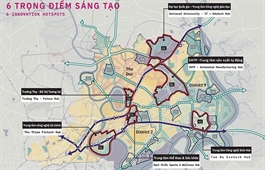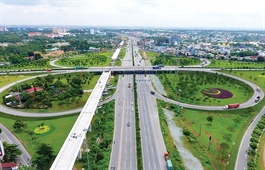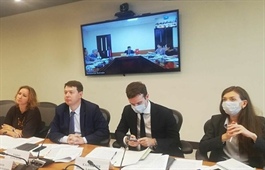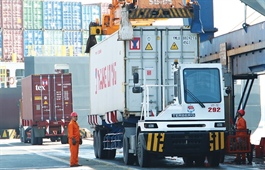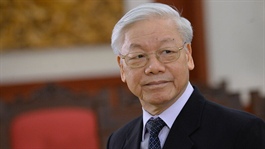Vietnam capable of overcoming unprecedented Covid-19 crisis: ADB
Vietnam capable of overcoming unprecedented Covid-19 crisis: ADB
Most countries that fended off the first Covid-19 wave and reopened their economies such as South Korea, Japan, and Vietnam, are now facing a second wave.
“Vietnam has the right capability and creativity to deal with the Covid-19 crisis efficiently,” Nguyen Minh Cuong, principal country economist of the Asian Development Bank (ADB) in Vietnam, told Hanoitimes.

Principal Country Economist of the ADB in Vietnam Nguyen Minh Cuong.
|
What is your assessment of Vietnam's achievements in socio-economic development, especially since the Doi moi (Reform) in 1986?
Vietnam has four major achievements in socio-economic development:
Firstly, Vietnam has been able to maintain a rapid, consistent, and comprehensive economic development since 1986. This is a considerable feat, in my point of view. Indeed, Vietnam’s development is only behind China in terms of stability, and much better than regional peers.
It is worth mentioning that Vietnam did not rely purely on any single driving force for growth. And the country’s inclusive growth translates into benefits for all economic participants.
Secondly, Vietnam’s success in eradicating poverty has been recognized widely by international communities and organizations, including the ADB, the World Bank and UNDP. In a short period of time, Vietnam’s GDP per capita had surged from an extremely low point of US$100 to US$2,700 in 2019.
As a result, the rate of poverty plunged from 60% in the 1990s to around 6% in 2019, which, I suppose only Vietnam and China are capable of making this accomplishment. Notably, Vietnam has fulfilled the Millennium Development Goals (MDSs) in eradicating extreme poverty and hunger in 2005, ten years in advanced of its deadline.
Thirdly, Vietnam has successfully transitioned from a centrally planned to a market economy. During this process, many key economic sectors have been restructured to become compatible with the market mechanism. Especially, the agricultural sector embraced a fundamental change and permitted farmland use right transfer.
Another key aspect is the business reform effort. In 1990, four years since the Doi moi, the introduction of the Law on Private Enterprises and the Law on Enterprises after that served as the platform for the development of a market economy in Vietnam.
Fourthly, Vietnam has actively integrated into the global economy. This integration process has been carefully planned and implemented step by step, and began with the country’s entry into ASEAN in 1995, and later APEC in 1998, WTO in 2007. Most recently, Vietnam’s international economic integration was accelerated by the signing of the Comprehensive and Progressive Agreement of Trans Pacific Partnership (CPTPP) and the EU – Vietnam Free Trade Agreement (EVFTA).
Vietnam’s efforts showed its consistent open-door policy and mitigated potential negative impacts that countries like Malaysia or Indonesia have gone through during their respective integration processes.
What should Vietnam focus on to maintain a rapid and sustainable economic growth?
Three decades ago, instead of banking on innovation and technologies, Vietnam was highly dependent on natural resources and cheap labor cost for growth, which unfortunately resulted in low labor productivity.
However, at the moment, the country has gained a solid step in improving labor productivity by diversifying growth driving forces, as all economic components have played their parts for growth, be it the agriculture, services, industry, exports or FDI.
For the next phase, Vietnam should further diversify sources for growth, meaning a more balance in contribution between the FDI, state, private sectors or domestic consumption.
In addition, the government should pay more attention to rural infrastructures and address the weak linkages between various transportation models. For instance, the cost of freight from a train station to the expressway could be higher than the fee for taking them from the North to the South.
And the legal framework remains an issue of utmost importance. To illustrate this point, let me give you a simple example. With favorable regulatory mechanisms, traffic participants will still ride on a rough, bumpy road even though it might affect the speed of the traffic stream. On the other hand, there would be no traffic on a road in excellent condition if the mechanism is inefficient.
This showcases the significance in improving the institutional environment, which is directly related to the business environment, the quality of legislation and the subsequent law enforcement process.
What do you think about the government's efforts in pursuing the dual target of containing the Covid-19 pandemic and simultaneously boosting economic growth?
Until this moment, Vietnam is among a handful of countries that have successfully contained the Covid-19 pandemic. However, there is no doubt that keeping pace with such a dual target is very challenging.
Nevertheless, Vietnam has acted quickly with various relief programs, including financial support for vulnerable people, waiving and freezing of taxes and fees, among others.
Similar to other countries, the issue that Vietnam was facing lied in the implementation process of these programs, which came on the back of the unprecedented scale of the pandemic and its unexpected timing.
I strongly believe that with Vietnam’s experience of dealing with hard decision, i.e. the transition to market economy in 1986 and the decision of joining ASEAN, the country has the right capability and creativity to come up with solutions to mitigate Covid-19 economic impacts in the upcoming months.
Prime Minister Nguyen Xuan Phuc has repeatedly mentioned the necessity of an expansionary fiscal policy to aid the economy. What do you think about the efficiency of this measure and what are your recommendations for the government?
There are similarities between Vietnam’s fiscal policy and that of others in terms of objectives, including support for workers, the business community and economic recovery. Besides, fiscal stimulus packages were offered in a timely manner in March and April, around the peak of the first Covid-19 wave.
A major difference is the scale of the fiscal support, which was dependent on the size of the economy. For example, Singapore’s fiscal stimulus package was around 20% of its GDP, Thailand's at 10%, Indonesia's at 7%, Vietnam and the Philippines' at 4%.
But if we take into account the VND700 trillion (US$30.2 billion), or 10% of Vietnam’s GDP, in public investment funds, the combined figure would be 14% of GDP.
As international practices have demonstrated in case of an unprecedented and dual crisis such as the Covid-19 pandemic, governments tend to not care much about public debt or fiscal deficit and instead adopt a “countercyclical” fiscal policy (increasing spending and cutting taxes during a recession).
Vietnam should give this a thought when dealing with public debt and fiscal deficit amid the current crisis.
Of course these are important matters. But if you look into a broader picture with macro-economic conditions taken into consideration, Vietnam remains a country with high economic stability. This is also a major advantage to attract foreign investors to the country rather than those with lower public debt to GDP ratio, such as the Philippines and Indonesia.
The Vietnamese government has to mull over its economic recovery outlook post-Covid-19, as this is the key for Vietnam to solve the issues of public debt and fiscal deficits. Once the global economy returns to its recovery track, Vietnam would find itself in an increasingly difficult situation to rebound since a massive number of Vietnamese enterprises are already bankrupt, and the unemployment rate is considerably high.
To have a broader perspective in supporting the economic recovery process, Vietnam may need to establish a national committee specialized in dealing with crisis and supporting economic recovery post-crisis. For sure, the issue of economic recovery would be at the center of Vietnam’s socio-economic development plan in the 2021 – 2025 period. Such a committee with specific tasks would be able to see things from multiple facets, not only from a fiscal or monetary perspective, but also from economic restructuring, global integration, and social security, among others.
Thank you very much!








